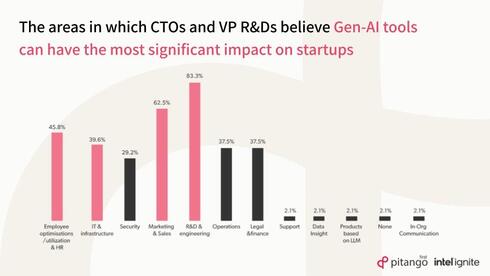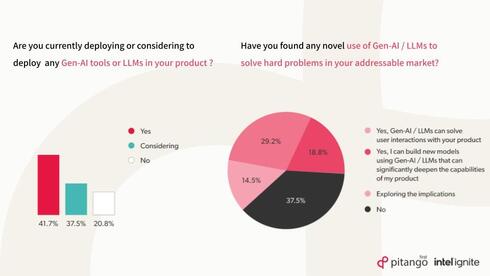
85% of CTOs will use GenAI and LLMs for their R&D teams
The joint survey, conducted by Pitango First and Intel Ignite, showed that more than half of participants see an ‘immediate’ effect on the way their teams operate
A new survey from Seed and early venture fund Pitango First and Intel’s acceleration program Intel Ignite has shined a light on some of the ways that CTOs and VPs of R&D will adopt Generative AI and LLMs in their work. More than 4 in 5 (85%) of respondents are already deploying, or plan to deploy, GenAI or LLM technologies either as part of their company offering or internally to help their business. The survey, conducted earlier this month and involving 48 VPs of R&D and CTOs from different industries, also revealed that almost two-thirds (60%) of respondents have found novel uses for LLMs to solve their “hard problems.”
“What makes the current times dramatic is the understanding that these foundational LLM models can only be developed and maintained by a few players,” said Avi Tel-Or, CTO of Intel Ignite Tel-Aviv. “All others are destined to consume it wisely and build their product and business on top of these models. In many ways, it is like the consolidation we saw in the chip manufacturing space in terms of the small numbers of players. On the other hand, it resembles the cloud revolution where infrastructure is commoditized.”
The survey demonstrates that the majority of respondents believe the deployment of these technologies will significantly impact their R&D processes, costs, infrastructure, team structure, and tasks. Notably, 84% predict R&D and engineering will be the most influenced areas, followed by marketing and sales (63%), employee utilization (42%), and IT, infrastructure, and operations (35%).
It is acknowledged that full-scale implications are yet to be understood - 40% have not yet found a use for LLMs to solve their “hard problems” in their respective markets, showing that the race has only begun for both startups and incumbents.
“GenAI and LLMs are behind the most significant inflection points of AI and are driving the entire industry to rethink its existing models,” added Aviv Barzilay, Senior Associate at Pitango First. “We're excited about the opportunities this presents for startups to disrupt existing domains controlled by incumbents, among many other factors. We see the uncertain macro-environment and decrease in capital availability as an opportunity for startups to leverage LLMs to expand their offerings while also restructuring the way they work, develop, support clients, and scale. One thing that has become clear is that the entire technology stack is changing at a pace we have never witnessed before and companies are required to react decisively and strongly.”
More than half of CTOs think that LLMs will become part of providing services to their users and that LLM-based technologies will be part of their products, but the majority of them (58%) have not yet tested tools utilizing LLMs provided by small startups.
Related articles:
Respondents answered questions last week in a variety of industries such as financial services, cybersecurity, managed services, retail, pharmaceutical, and hardware. CTOs and VPs of R&D surveyed work in both startups and enterprises located in the U.S. and Israel.


